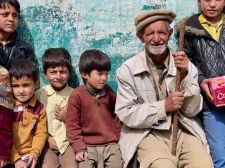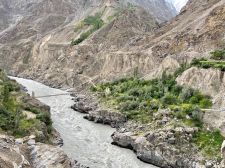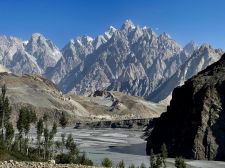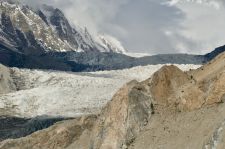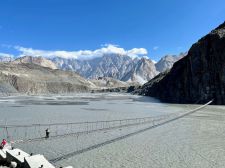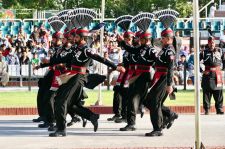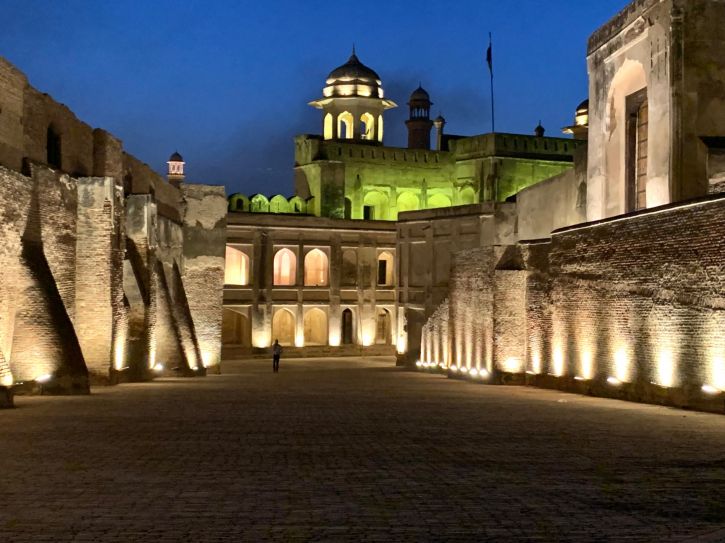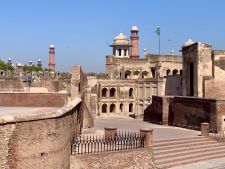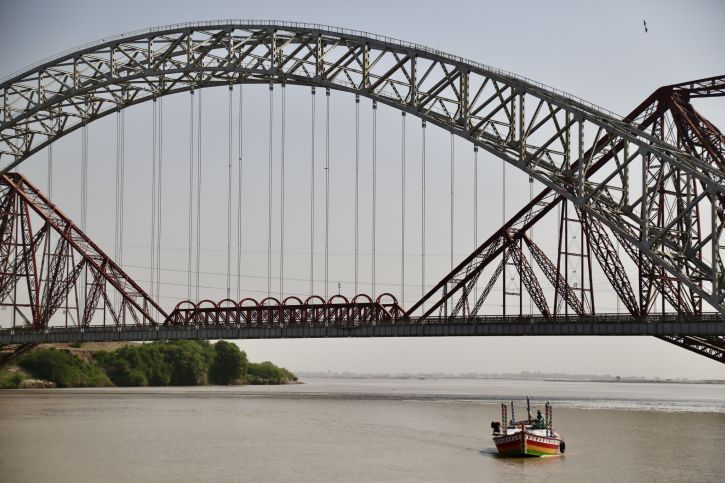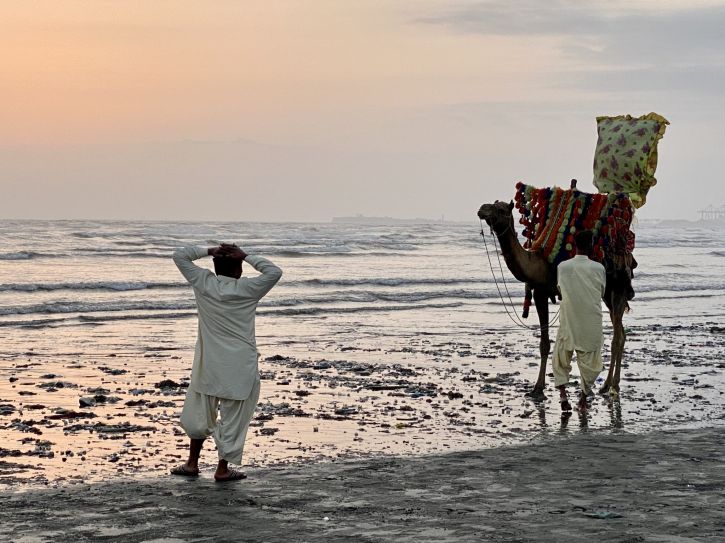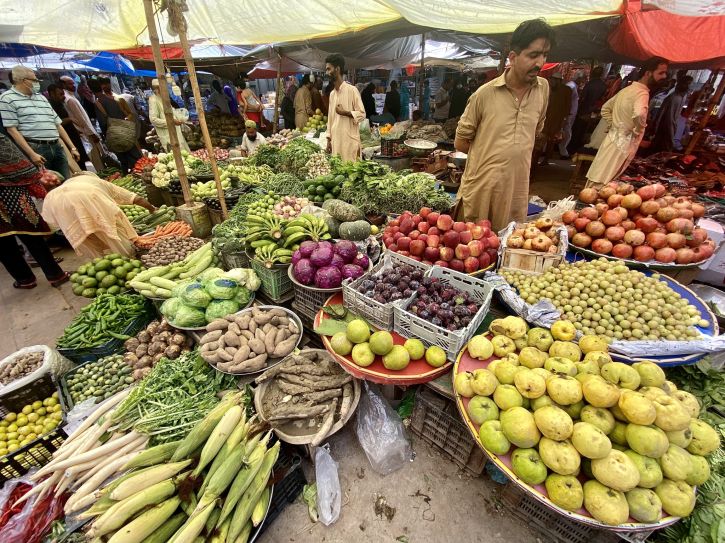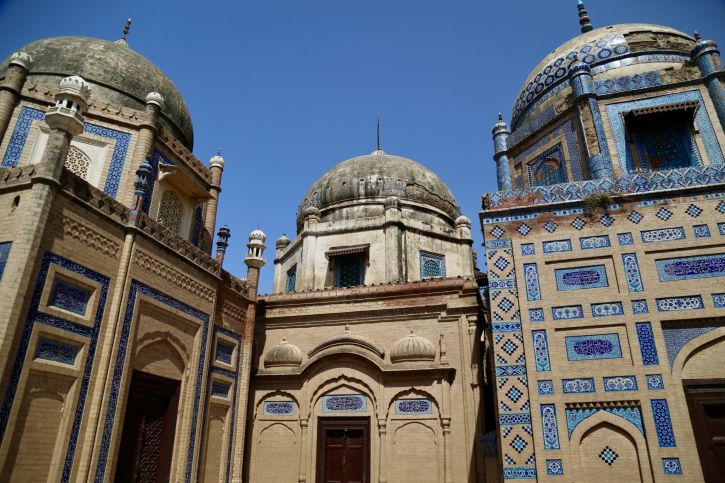Our full tour of Pakistan combines the splendour of the mountains in the north of the country with the vital cultural and historical sites found in the south. Together, this makes for the most comprehensive tour of Pakistan you could wish for! Led by a senior tour leader and hosted by our outstanding local partners, this tour will make this a truly remarkable travel experience in this off-the-beaten-track destination.
Prices below are per person, twin-sharing costs in US Dollars (USD). Pricing does not include airfare to/from the tour and any applicable taxes. For single supplement rates and taxes (if any), please refer to below Prices & Dates table. For general information on flights to/from the tour, click here.
Your Travel and Accommodation Arranged For You
Tips Included for Driver, Restaurant Staff, Local Guides
Authentic Local Experiences With Lots Of Inclusions.
Select a date below to reserve your spot:
Optional Single Supplement: $2230 USD (number of singles limited).
This tour may require a mandatory single supplement charge of $2230 if you join our share program and we are unable to pair you.
Download Itinerary
Day 1 Arrival in Islamabad
Today we assemble in Islamabad - welcome to Pakistan!
About this Itinerary: This is our best hope for what we expect to accomplish on our trip, however a "go with the flow" attitude is necessary. While we and our local partners have tried our best to make this itinerary as accurate as possible, it should be considered an approximation of activities rather than a strict schedule. Though we try our best to adhere to the schedule, many unforeseen factors influence our tour -- weather conditions, health, route conditions, government restrictions, and other factors beyond our control. Alternative arrangements will be sought in such circumstances and the program will be modified accordingly.
Overnight in Islamabad.
Included Meal(s): Dinner
Day 2 Islamabad Sightseeing
After a leisurely morning (due to the possibility of late-night arrivals and the lingering effects of jetlag), we'll begin our exploration of Islamabad, the capital of Pakistan. This modern, lush, green, and spacious city was established in the 1950s against the backdrop of the Margalla Hills at the northern edge of the Potohar Mountain Range.
We visit the Pakistan Monument at Shakar Padian Hill, continuing to Lok Virsa and the National Institute of Folk and Traditional Heritage. Next we visit the world’s second largest mosque, the Shah Faisal, designed by the Turkish architect, Vedat Dalokay, and financed largely by donations from Saudi Arabia. We drive through the diplomatic enclave, past the Supreme Court of Pakistan, the Prime Minister’s House, and Parliament house.
We can also visit a typical shopping mall, where you can, among other things, see/buy a typical Pakistani outfit, designed and created by famous local designers.
Overnight in Islamabad.
Included Meal(s): Breakfast, Lunch and Dinner
Not finding what you're looking for?
Our specialists can take away the stress and create a private custom tour tailored to your exact interests and budget.
Day 3 Islamabad: Taxila & Rawalpindi
After breakfast we depart the city by road and travel approximately one hour to Taxila, one of the sub-continent’s most important archaeological treasures, with the remains of three great cities and dozens of Buddhist monasteries dating from 600 BCE to AD 600. It is strategically located at the meeting place of trade routes linking China, India, Central Asia, and the West. Taxila survived through many empires and became the cultural crossroad of the ancient world.
Buddhism took hold in the region around 275 BCE and from here the religion spread to Central Asia, Tibet, and China. We visit Taxila Museum, famous for its finest examples of Gandharan sculptures and art. It also houses some of the important artifacts and discoveries of ancient civilizations. We visit one of the important Buddhist stupas at Dharmarajika. If weather and time permits, we'll visit the nearby ancient city of Sirkap.
We continue to Rawalpindi for a break for lunch followed by a visit of the historic city and old bazaar.
Return to Islamabad.
Overnight in Islamabad.
Included Meal(s): Breakfast, Lunch and Dinner
Day 4 Islamabad - Naran
After an early breakfast we depart Islamabad for Naran (6-7 hour drive) north of Islamabad. The first 3 hours take us through the district of Hazara in Khyber Pakhtunkhwa Province. The road runs through the green and well-forested western Himalayan spurs of the Hazara district. En route we pass through Abbottabad, Mansehra, Balakot, and Kaghan.
The area has rich history with the earliest written accounts dating back to Alexander’s conquest of the region in the 4th Century BCE, followed by Buddhist rule in the 3rd century BCE, which left behind some interesting archaeological sites such as Asoka's Rock Edicts at Manshera, dating back to around the 3rd Century AD.
Overnight in Naran (2400m/7,875 ft)
Included Meal(s): Breakfast, Lunch and Dinner
Day 5 Naran - Hunza via Babusar Pass
Today's journey continues via the N15 highway toward Babusar Pass, which connects province of Khyber Pakhtunkhwa with Gilgit Baltistan.
Before the construction of the Karakoram Highway (KKH), Babusar Pass, at 4173m (13,690 feet), some 70km from Naran, was the main route for crossing into Pakistan's Northern Areas (Gilgit Baltistan). The road, diminishing to just a jeep track at its completion in 1898, is now a well-made road, which follows the Kunar River, passing through small towns such as Battakundi, Burawai, and Besal. Beyond Burawai the road rises further and the scenery starts to change, with silver fir and blue pine trees becoming scantier and the hills barer.
Continuing north from Besal, the road runs along the 2.5km long Lulusar Lake with its deep green waters and reaches Gittidas, the last village before the pass. The valley broadens out here, and further on steadily climbs for around seven kilometres to the summit of Babusar Pass (the highest point on our journey), continuing down the other side to Chilas on the Karakoram Highway. We will be rewarded by the spectacular panorama that greets us on our final descent.
From Babusar Pass the road passes through Thak Valley to Chilas. There are many rock carvings at Chilas, the majority of which date back to the Buddhist pilgrims who frequented these routes while travelling between China and the great Buddhist sites of south Asia.
After a break at the Shangrila Hotel in Chilas, we continue up the KKH to Gilgit (257km). The road winds round the foot of Nanga Parbat (8125m/26,660 ft), the world's ninth highest mountain, located at the western tip of the Himalayan Range. Before Gilgit we stop at the meeting of three of the world's greatest mountain ranges: the Himalaya, Karakoram, and Hindu Kush.
We continue to witness splendid scenery as we near Hunza -- weather-permitting we hope to see spectacular Rakaposhi Peak with its snowy crown. The route is abundant with terraced fields flanked by tress, particularly pretty in spring with apricot, apple, and peach blossom. In autumn the very same trees set themselves ablaze with fiery shades of yellow, orange, and red.
This afternoon we arrive in Karimabad village, the largest and main centre of Hunza, set on a mountainside with water channels defining the tiered levels of the villagers' fields and houses. Looming above the village of Karimabad, are several noteworthy peaks, including Ultar Peak (7388m/22,440 ft) and its glacier as a curtain backdrop, a majestic view of Mt. Rakaposhi (7788m/25,550 ft) and Diran Peak (7257m/23,810 ft). These views of the surrounding snow-capped mountains are spectacular.
Upon arrival in Karimabad Hunza, we continue to Altit in the small neighbouring valley to Karimabad. After hotel check-in and a chance to freshen up, we may have a chance to visit historic Altit Fort. This historic small fort is perched on a rocky outcrop high above the Hunza River, the only river that cuts through the width of the mighty Karakoram. The fort's balcony overlooks a village of mud houses with flat rooftops used as extra work areas for drying fruit etc. Prince (King) Charles and Camilla visited Altit Fort along with Prince Karim Aga Khan when it was still being restored in October of 2006. We will visit this fort tomorrow if we do not have enough time on this day.
Overnight in Hunza (Altit or Aliabad, approx 2500m/8,200 ft).
Included Meal(s): Breakfast, Lunch and Dinner
Day 6 Hunza: Baltit Fort & Village Excursion
After a relaxed breakfast we head out to visit Baltit Fort. Hunza was a princely state ruled by one family, the Ayashkutz, for over 900 years. The ruler of Hunza was called the Mir of Hunza by outsiders and Thum by locals. The people of Hunza are called the Hunzokutz. The rule of the Ayashkutz family came to an end when, in 1974, the then Prime Minister, Zulfiqar Ali Bhutto, abolished all the princely states in Pakistan.
Baltit Fort was occupied by some of the elderly members of the Ayashkutz family until 1960; Mir himself had already shifted to a new palace much earlier. In 1996 Baltit Fort was reopened after a meticulous restoration by the Aga Khan Trust for Culture. It has been transformed into a heritage museum, and has been given several international awards. Later we visit the local bazaar before continuing back to our hotel.
Overnight in Hunza (Altit or Aliabad).
Included Meal(s): Breakfast, Lunch and Dinner
Day 7 Hunza - Hoppar Valley - Duiker
Today we leave the Hunza Valley and cross the river to the Nagar Valley. This region holds some of the region's larger glaciers, the starting point for some of the more popular trekking routes. The valley lies along the southwest boundary of the Bualtar Glacier and offers a unique characteristic, transformed and created by glaciers. We walk through Hoppar village and enjoy lunch among the glaciers with fine views all around.
We return to Karimabad and continue to Duiker, the highest settlement in the area (2850m/9,350 ft), and the highest overnight point on our tour. Before sunset, we walk to a close-by point to enjoy magnificent 360° view of the snow-covered peaks and the valley below.
Overnight in Duiker.
Included Meal(s): Breakfast, Lunch and Dinner
Day 8 Duiker - Attabad Lake - Janapad Passu
Duikar – Attabad Lake - Passu
Today we will depart for Passu, another couple of hours drive to the north. We will see Attabad Lake, formed in 2010 due to a landslide that blocked the Karakorum Highway and the Hunza River. As of 2015 there is road access again while the river continues to flow southward after a team of Pakistani and Chinese engineers completed the necessary tunnels. We stop at various points for views of the pristine blue waters and we will get an opportunity to take a traditional boat excursion out on the lake (or on our return, depending on the timing and the weather).
Time permitting, we will also have an excursion to see the mountain scenery at and around Borith Lake, a resting point for several species of birds during their migrations.
We continue on toward Janapad Passu and our overnight accommodations (2600m/8,530 ft)
Overnight in Janapad Passu.
Included Meal(s): Breakfast, Lunch and Dinner
Day 9 Passu & Khunjerab Pass
After breakfast we drive to Sost, the last border town on the KKH, and continue to Khunjerab National Park. The park has an area of 2270 sq km and it is one of the highest altitude national parks in the world. It was established in 1979 by Z.A. Bhutto and consists of three deferent valleys: Khunjerab, through which the KKH passes; Ghujerab, and the remote Shimshal Valley. At the end of valley, there is 4700m/14,420 ft Khunjerab Pass, the world's highest paved road crossing the international border to China.
Today's drive takes us through high, wild, and magnificent scenery. The region is home to Markhor (Marco Polo) sheep, Himalayan ibex, blue sheep, snow leopards, and Tibetan wolves. We are also close to the Wakhan Corridor, a snaky bit of Afghanistan created at the turn of the last century by the British and Russians to keep both empires apart.
We return to our accommodations in Passu after our excursion to Khunjerab. Weather permitting, we hope to also see the peaks known as the Passu Cones at some point during our visit.
Overnight in Passu.
Included Meal(s): Breakfast, Lunch and Dinner
Day 10 Passu - Gilgit & Kargah
After a relaxed breakfast we'll continue our journey with a scenic drive (3-4 hours) back to Gilgit. This afternoon we visit nearby Kargah, known for its large standing Buddha carved high on a cliff face. We visit the bazaar before retiring to our hotel.
Overnight in Gilgit (1500m/4,920 ft).
Included Meal(s): Breakfast, Lunch and Dinner
Day 11 Gilgit - Kachura - Shigar
After breakfast we drive to Kachura-Skardu, capital of Baltistan. In no other part of the world is there such a large number of high mountains in such a confined space as in Baltistan. The ideal route is from the west, which follows the Indus River for 106km/350 mi from the KKH to the capital town of Skardu. Previously this was a route plagued with rockfalls and slow-moving traffic on a narrow rough track. Recently, however (from 2018 - ongoing), this road has been expanded and paved by the Pakistan Army Engineers.
Soon after leaving the KKH and crossing Gilgit River at Maqpun Das, we will see the magnificent Nanga Parbat’s west face, 9th highest peak in the world (8125m/26,660 ft) and the 2nd highest mountain of Pakistan.
After a lunch stop in Kachura we continue through the town of Skardu to Shigar, the last part of which passes through a "cold desert" region, a unique landscape with large sandy dunes flank the river when it is not in flood with melting snows. The broad fertile Shigar Valley is ringed by mountains, several snow-capped year round. The town of Shigar is the gateway to the great Karakoram mountains and "Eight-thousanders," 14 mountains that are more than 8000 meters, including K2, the second highest mountain in the world.
We overnight at Shigar Fort, which has won many international tourism and historic awards for its quality restoration by the Aga Khan Trust. We will likely have a local site guide take us around on a tour of Shigar Fort shortly after our arrival.
Overnight in Shigar (2230m/7316 ft).
Included Meal(s): Breakfast, Lunch and Dinner
Day 12 Shigar Sightseeing
Our day will unfold based on factors such as the weather. We will have a walk through the relaxed town of Shigar where you may have the opportunity to interact with the people living in this lush natural environment. The locals produce apples, apricots, pears, cherries, and walnuts. Our exploration of the town will also include the delicately-constructed wooden mosque of Amburiq, built in the 14th-century by Kashmiri craftsmen and restored by a conservation group in an effort to preserve the Tibetan and Kashmiri architecture of the original structure.
Today we will also embark on a 4WD excursion to take in the expansive valley and mountain views nearby.
Overnight at Shigar Fort.
Included Meal(s): Breakfast, Lunch and Dinner
Day 13 Shigar - Fly to Islamabad
After breakfast we transfer to the airport at Skardu for our flight to Islamabad. It is 1 hour flight known for spectacular mountain views.*
Upon arrival we transfer to our hotel for check-in. Later we will visit the nearby Pakistan National Council of Art Museum.
* In the event of flight cancellation (ie due to weather), we will travel back to Islamabad by road today and tomorrow.
Overnight in Islamabad.
Included Meal(s): Breakfast, Lunch and Dinner
Day 14 Islamabad & Excursion to Peshawar
Today we have an excursion to Peshawar.*
Khybar Phakhtoon Khwa Province, formerly known as North West Frontier Province, is Pakistan’s most diverse, covering an area of over 100,000 square kilometers including the Tribal Areas. KPK stretched from Pamir in the extreme north all the way south as far as Dera Ismail Khan on the banks of the Indus River, encompassing high mountains, fertile river basins, and semi-arid deserts. At the heart of the province is the Peshawar Valley. Its rich alluvial soils, watered by the Kabul and Swat rivers, make this amongst the most productive agricultural regions in Pakistan.
The drive to Peshawar is a unique experience. For centuries, traders and invaders made their way to/from India, making and losing fortunes. You can still see traces of those times, in terms of fortresses and caravanserais (inns).
The romance of Peshawar has traditionally been linked to its frontier location close to the historic Khyber Pass (due to security reasons, it is closed to visitors since 9/11). Today Peshawar is a large rapidly-developing and growing city, but with a distinct character all of its own. Indeed much of its unique atmosphere still thrives in the fascinating bazaars of the old city. In the traditional Central Asianstyle, the Old City was formerly completely encircled by a wall and centered on a citadel.
In the late afternoon we return to Islamabad.
* The above described Peshwar excursion will occur only if our previous day's flight is not cancelled due to weather. In the event of cancellation, this day will be a continuation of our road journey back to Islamabad.
Overnight in Islamabad.
Included Meal(s): Breakfast, Lunch and Dinner
Day 15 Islamabad - Hindu Temple at Katas - Lahore
Today we travel by road to Lahore via Katas.
In the village of Katas there are extensive Satghara Hindu temples, centered around a large pool and spring. According to legend the pool was formed of tears from Shiva’s eye as he wept over the death of his wife Parvati. Tears from his second eye fell near Amjer in Rajasthan forming a second pool. The oldest temple on the hill overlooking the complex has a narrow staircase inside which leads up onto the top of the roof overlooking the site and a very good view of the surrounding hills. We then continue to Lahore.
PLEASE NOTE: This evening we may/will likely be meeting travellers arriving today to join our Southern Pakistan tour. For the short time in Lahore, our total group size owing to this overlap may exceed our usual maximum; however, this will be deftly managed with multiple vehicles and guides, such that we won't feel "crowded" for our sightseeing and at meal times over the next two days.
Overnight in Lahore.
Included Meal(s): Breakfast, Lunch and Dinner
Day 16 Lahore: Royal Bath, Lahore Fort & Badshahi Mosque
Today we explore Lahore.
We visit the Shahi Hamam and Walled City of Lahore, containing many buildings, bazaars, public spaces, and monuments of high cultural, architectural, and historic value. The Shahi Hammam is located inside Delhi Gate and provides an ideal context for welcoming visitors to the Walled City. In 2012, the Walled City Authority created an enabling environment for the restoration of the Shahi Hammam by removing commercial encroachments around the historic building.
Next is the Wazir Khan Mosque, located further inside the Walled City. The mosque was built in 1643 and is renowned for its use and execution of inlaid pottery decoration in the wall paneling. The Badshahi Mosque was built for the Emperior Aurangzeb in 1673-74 and is Lahore’s most striking building.
Modelled on the great Jami Masjid in Delhi, it has an impressive 20 meters high gateway and a central prayer chamber topped by three large white marble domes that open onto an enormous courtyard. It has space for 100,000 worshippers at a single time.
We also visit Lahore Fort, built by the Mughals during the their days of rule. The fort contains some of the most impressive secular Mughal buildings in South Asia. Embellished with carved red sandstones, marble, pietra dura work, glazed colored and Kashi tile works plus frescos depicting princely pleasures. It is more a "place" than just a fort.
Overnight in Lahore.
Included Meal(s): Breakfast and Dinner
Day 17 Lahore: Lahore Museum, Shalimar Garden & Waga Border
After breakfast we visit Lahore Museum, Shalimar Garden, and the flag lowering ceremony at Wagah Border.
Lahore Museum is the oldest and best in Pakistan. The museum's first curator was John Lockwood Kipling, father of Rudyard Kipling who referred to the museum as the "Ajaib Ghar" or House of Wonders. The coin collection here is extremely valuable with some from the period of Alexander the Great.
Standing outside the museum is the famous Zam Zama Gun. Immortalized by Kipling in the opening lines of “Kim” this mighty cannon is so named because on firing it resembles a lion’s roar. The gun saw action in the Battle of Punjab 1761 and was badly damaged in the battle of Multan in 1818. It was subsequently retired to Lahore Fort, and finally moved to its present location in 1870.
We then visit the Shalimar Gardens, dating from the period when the Mughal Empire was at its artistic and aesthetic zenith. Laid out as a Persian paradise, it was intended to create a representation of an earthly utopia in which humans co-exist in perfect harmony with all elements of nature. In 1981 the Shalimar Gardens were inscribed as a UNESCO World Heritage Site as they embody Mughal garden design at the apogee of its development.
Finally we then witness the Flag Lowering Ceremony at Wagah Border, an interesting daily 'Beating Retreat' ceremony at Wagah border since 1959. Indian and Pakistani security forces jointly drill a very seriously provocative parade, imbued with humour and drama. The ceremony starts with a blustering parade by the soldiers from both sides and ends up with the perfectly coordinated lowering of two nations' flags. Flags are folded and the ceremony ends with a retreat that involves abrupt handshakes between the soldiers of each side followed by the closing of the gates.
Overnight in Lahore.
Included Meal(s): Breakfast and Dinner
Day 18 Lahore - Harappa - Multan
After breakfast we embark on our drive to Multan. En route we visit the second most famous ancient city of the Indus valley civilization, Harappa. The morning drive to Harappa will take approximately 4 hours.
Harappa is an ancient city located in present-day Pakistan that was once the centre of the Indus Valley Civilization, one of the world's earliest urban civilizations. The city was inhabited around 2600 BCE and is considered one of the most important archaeological sites in South Asia. The city's sophisticated urban planning, advanced sanitation system, and impressive architecture provide insight into the complex society that once existed there. The remains of Harappa show evidence of a highly organized city, with structures made of baked bricks, public baths, and an extensive drainage system. The civilization's writing system, which has yet to be deciphered, was also discovered at the site. Harappa's significance lies not only in its impressive urban planning and architectural feats but also in the insights it provides into the culture and daily life of the ancient Indus Valley Civilization.
During our time at Harappa we will tour the site and visit the local archaeological museum.
After lunch and our visit we continue driving towards Multan (approximately a 3 hour drive). If we have enough time on this day we will stop en route at a factory that produces the famous blue pottery of Multan (otherwise we will visit the next day).
Overnight in Multan.
Included Meal(s): Breakfast, Lunch and Dinner
Day 19 Multan Sightseeing
We have a full day to explore Multan, the city of Saints.
The city dates back over 5,000 years and is believed to have been one of the earliest human settlements in the world. The city is known for its rich cultural heritage, ancient monuments, and exquisite handicrafts. Multan is also known as the "City of Sufis" due to its many Sufi shrines, which attract devotees from around the world. The city's most famous landmarks include the historic Multan Fort, the beautiful Mausoleum of Shah Rukn-e-Alam, and the intricately designed tombs of the Sufi saints Hazrat Bahauddin Zakariya and Shah Shams Tabrez. Multan is also renowned for its production of high-quality textiles, pottery, and handicrafts, which are popular both locally and internationally. We begin our tour with a visit to the famous Sufi shrines. Afterwards we will visit the Hussain Agahi Bazaar, a huge market full of local colour.
Overnight in Multan.
Included Meal(s): Breakfast, Lunch and Dinner
Day 20 Multan - Bahawalpur
After breakfast, we begin our drive to the city of Bahawalpur (approximately a 2 hour drive). The city was founded in the 18th century and is known for its rich cultural heritage, stunning architecture, and beautiful landscapes. The city's most famous landmark is the Bahawalpur Palace, also known as the "Sadiq Garh Palace," which was built in the 19th century and is one of the largest palaces in Pakistan. Unfortunately, the palace is operated by the Pakistan military and is usually not open to the public for viewing.
Upon arrival we will visit the famous Library of Bahawalpur, a historic institution located in the heart of the city. The library was established in 1924 by the Nawab of Bahawalpur, Sir Sadiq Muhammad Khan V, and was initially housed in a small room in the city's Victoria Hospital. Today, the library is housed in a beautiful building constructed in the colonial style and is home to over 200,000 books, including rare manuscripts and documents dating back several centuries. The library is renowned for its collection of books on Islamic history and culture, including rare copies of the Quran and other important Islamic texts. The library also boasts a large collection of English and Urdu literature, as well as books on science, history, and philosophy. The Library of Bahawalpur is not only a treasure trove of knowledge and information but also a stunning example of colonial architecture, making it a must-visit destination for anyone interested in the history and culture of Pakistan.
Overnight in Bahawalpur.
Included Meal(s): Breakfast, Lunch and Dinner
Day 21 Bahawalpur Area Touring
After breakfast we will drive to Derawar Fort (+/- 2 hours) at the edge of Cholistan Desert (an extension of the Thar Desert - the largest desert in the subcontinent). Derawar Fort is a massive historical structure. The fort was built in the 9th century by the Bhatti Rajput dynasty and is a stunning example of desert architecture. The fort is surrounded by a 30-meter-high wall with 40 bastions, making it an imposing sight against the backdrop of the desert. The fort has been home to several different rulers over the centuries, including the Nawabs of Bahawalpur, who added several new structures to the fort in the 18th and 19th centuries. Today, the fort is a popular tourist destination and has been used in several films and television shows in Pakistan. The fort area is also home to several important Sufi shrines, including the Tomb of Derawar's 7 Saints, which is visited by thousands of devotees every year. While we are here, we will visit the fort, the nearby mosque, and the intricately designed mausoleums located at the necropolis of the Abbasi Nawabs.
After lunch and our visit to the sites, we will return to Bahawalpur for the night.
Overnight in Bahawalpur.
Included Meal(s): Breakfast, Lunch and Dinner
Day 22 Bahawalpur - Sukkur
After breakfast, we begin our drive to Sukkur. On the way, we will stop at the city of Uch Sharif (+/- 1.5 hours), an ancient town located in the southern region of the Punjab region. The town is known for its rich cultural heritage and historic landmarks, including several important Sufi shrines. The town dates back over 5,000 years and was once an important centre of learning and commerce. Today, Uch Sharif is home to several important landmarks, including the Shrine of Bibi Jawindi, a Sufi saint. Bibi Jawindi was the great-granddaughter of another famous Sufi saint, Sheikh Bahauddin Zakariya. The shrine was built in the 14th century and is considered one of the finest examples of Islamic architecture in Pakistan. The shrine's exterior is decorated with intricate tile work and calligraphy, while the interior is adorned with stunning frescoes and carvings. The shrine is a popular pilgrimage site for Sufi devotees from around the world, who come to pay their respects to Bibi Jawindi and seek blessings for themselves and their families.
The town is also home to the Tomb of Jalaluddin Bukhari, which is believed to be the oldest monument in Uch Sharif and is a testament to the town's ancient history.
We then continue onward to the city of Sukkur (+/- 4 hours). The city is home to several important landmarks, including the Tomb of Seven Sisters and the Lansdowne Bridge, which is considered one of the longest surviving British colonial-era bridges in the world. Sukkur is also renowned for its handicrafts, including pottery, textiles, and leather goods, which are sold in the city's markets.
In the late afternoon we will visit the famous Hindu pilgrimage centre of the Tomb of the Seven Sisters. The tomb is believed to be the final resting place of seven sisters who were martyred for their faith during the reign of Mughal emperor Aurangzeb. The sisters belonged to a wealthy Hindu family and refused to convert to Islam, even when faced with persecution and death. The tomb was built in the 18th century and is a stunning example of Mughal architecture. The tomb's exterior is decorated with intricate tile work and calligraphy, while the interior is adorned with beautiful frescoes and carvings. The Tomb of Seven Sisters is a popular pilgrimage site for Hindus and Muslims alike, who come to pay their respects to the martyred sisters and seek blessings for themselves and their families.
From nearby the tomb, we will hop aboard a traditional Indus River boat for a short ride on the river to enjoy sunset and also to get an opportunity to spot the river dolphins that are often seen frequenting the area.
Overnight in Sukkur.
Included Meal(s): Breakfast, Lunch and Dinner
Day 23 Sukkur - Mohenjo-Daro - Larkana
After breakfast we drive to Kot Diji archaeological site and fort (+/- 1 hour). This site stands on one of the rare outcroppings of limestone that are part of the Rohri Hills to the north. The site, which dates from 3500 to 2500 BC, has two distinct parts to the site. Excavation of the upper level revealed pottery of the Harappan civilization, while the lower levels exposed evidence of an unknown pre-Harappan culture, designated as Kot Deji. On top sits the historic fort and this dates back to the 18th century. The fort is surrounded by a 25-meter-high wall with 5 bastions and features beautiful gardens, ornate carvings, and intricate tile work. The fort was built by Mir Sohrab Khan Talpur, who was the ruler of the Khairpur State, and served as a strategic defence fortification against invading forces. The fort has several important landmarks, including the Darbar Hall, which is adorned with beautiful frescoes and carvings, and the Shish Mahal, which is a stunning example of Mughal architecture.
Afterwards we continue by bus to one of the true highlights of the tour - the famous archaeological site of Mohenjo-Daro. This incredible site dates back over 4,500 years and is one of the world's earliest urban settlements. The city was an important centre of the Indus Valley Civilization, which flourished between 2600 BCE and 1900 BCE, and is renowned for its advanced urban planning, sophisticated drainage systems, and impressive architecture. The ruins of Mohenjo-daro include several important landmarks, including the Great Bath, which is a large public bathing pool, and the Granary, which is believed to have been used for storing crops. The city's unique architecture and advanced urban planning provide insight into the complex society that once existed there. The city is also renowned for its exquisite handicrafts, including pottery, jewelry, and textiles, which were produced by the skilled craftsmen who once resided there. Mohenjo-daro is not only a testament to the rich cultural heritage of Pakistan but also a symbol of the ingenuity and creativity of the people who built it.
We depart Mohenjo-Daro in the late afternoon for Larkana, our overnight stop.
Overnight in Larkana.
Included Meal(s): Breakfast, Lunch and Dinner
Day 24 Larkana - Hyderabad
After breakfast we drive on the Indus highway towards Hyderabad via the city of Sehwan Sharif (+/- 3 hours) where we will visit the famous Sufi shrine of 12th AD Lal Shahbaz Qalander. The shrine is dedicated to the Sufi saint Lal Shahbaz Qalandar, who was a renowned poet, philosopher, and musician, and is considered one of the most important Sufi saints in South Asia. The shrine was built in the 14th century and is a superlative example of Islamic architecture. The shrine's exterior is decorated with intricate tile work and calligraphy, while the interior is adorned with beautiful frescoes and carvings. The shrine is a popular pilgrimage site for Sufi devotees from around the world, who come to pay their respects to Lal Shahbaz Qalandar and seek blessings for themselves and their families. The shrine is also well-known for its vibrant atmosphere, with music, dance, and poetry recitals taking place throughout the day and night.
We continue on our way to Hyderabad (+/- 2 hours). The city is home to over 6 million people and is the second largest city in Sindh province. The city is renowned for its delicious cuisine, which features a mix of Pakistani, Indian, and Persian influences, and is best enjoyed in the city's many traditional restaurants.
Overnight in Hyderabad.
Included Meal(s): Breakfast, Lunch and Dinner
Day 25 Hydarabad - Thatta - Makili - Chokundi - Karachi
We depart after breakfast on our drive toward the city of Thatta (+/- 2 hours) to visit the famous Shah Jahan mosque, one of the most beautiful and significant mosques in the country. The mosque was built in the 17th century by Mughal emperor Shah Jahan and features a beautiful facade adorned with intricate tile work and calligraphy, while the interior is decorated with beautiful frescoes and carvings. The mosque is a popular pilgrimage site for Muslims from around the world, who come to pray and seek blessings. Thatta is also home to several other important landmarks, including the Makli Necropolis, which is one of the largest and most impressive cemeteries in the world, and the historic Keenjhar Lake, which is believed to have been the site of a romantic encounter between the Sindhi prince Noor Muhammad and the beautiful Sohni.
During our time here, we will visit the Shah Jahan mosque, explore the Makli Necropolis, and take in the views at Kanjur Lake before we continue on the way to Karachi (approximately 2 hour drive).
Overnight in Karachi.
Included Meal(s): Breakfast, Lunch and Dinner
Day 26 Karachi: City Tour
Karachi is the largest and most populous city in Pakistan, located in the southern province of Sindh. It is a pulsating mega-city with a rich cultural heritage and a diverse population, reflecting the city's long history as a centre of trade and commerce. Our full day visit of Karachi will begin with the Mausoleum of Muhammad Ali Jinnah, the founder of Pakistan. We then continue to the National Museum of Pakistan with its numerous fascinating galleries. The museum features a multitude of artifacts including objects from the pre- and proto-history of the region (5000 to 1500 BC). After lunch, we will tour the Mohatta Palace Museum near Clifton Beach, where there are always unique collections of art and textiles on display. The Mohatta Palace was built in 1927 by Shivratan Chandraratan Mohatta, a Hindu Marwari merchant from modern-day Rajasthan in India. After partition, the palace became the property of the state and initially housed Pakistan’s foreign affairs office when Karachi was the capital of Pakistan. After the capital was moved to Islamabad, the palace became the private residence of Fatima Jinnah, a Pakistani dental surgeon and political leader and one of the founders of Pakistan. Later,on the Sindh government converted it into a museum and meticulously restored it to its former glory. If time permits we will also visit the Saddar Bazaar (Empress Market).
To wrap up our tour of Karachi and South Pakistan, we will make our way to Clifton Beach to watch the sunset over the Indian Ocean. Afterwards we will return to our hotel and enjoy our farewell dinner.
Overnight in Karachi.
Included Meal(s): Breakfast, Lunch and Dinner
Day 27 Departure
Departure from Karachi.
SAFE TRAVELS!
Included Meal(s): Breakfast
Inclusions
Hotel breakfast included daily; all dinners and most lunches are included on all full touring days. A picnic lunch and assorted snacks/purified water will be provided on some long travel days (most in the north where other options are limited); evening meals on tour will be taken mostly at hotels where we are staying. Bottled water will be provided at lunch and dinner, as well as on the road throughout the day.
All transport (including internal flight and alternative land transport in the event of flight cancellation); accommodation, sightseeing and entrance fees for sites noted as 'visited' in the detailed itinerary. Services of a full-time Adventures Abroad Tour Leader and local English-speaking step-on guides at several locations on our route.
Gratuities for drivers, restaurant/hotel staff, porters, local guides. Airport transfers for land & air customers. If you extend your stay pre- or post-tour, we will include your airport transfers if you book both your air and extra nights through us.
We also include your 'Letter of Invitation' required to apply for your visas (see "Exclusions").
Exclusions
International airfare to/from the tour.
Tour Leader gratuities, personal items (phone, laundry, etc), additional beverages, any meals not listed in the itinerary, international (if applicable) air taxes, visa fees (see below), and any excursions referenced as 'optional'.
Airport transfers for Land Only customers (available for purchase).
Optional trip cancellation insurance (strongly recommended). Our post-reservation trip notes offer further guidance on visas, any not included meals, money matters, what to bring, etc.
Visas: A tourist visa is required to travel to Pakistan, which is not included in the cost of your tour. This must be obtained in advance of your arrival and can be acquired online (Canadian, USA, UK passports). We will provide you with a 'Letter of Invitation' to assist you in applying for your visa (included). More information will be provided in your pre-departure notes emailed at time of reservation.
Seasonality and Weather
Pakistan’s climate is difficult to pin down as a single entity. It ranges from tropical and subtropical to semi-arid and desert, and then up north you’ve got the ridiculously beautiful – and ridiculously cold – mountainous areas incorporating the Karakoram, Himalaya, and Hindu Kush ranges. In the south things are more temperate and we may even experience some heat in some locations.
October is the month when autumn arrives in the valleys, bringing with it a vibrant palette of leaf colour and slopes high above covered in snow, making this a very picturesque season in the region. In the south, the extreme heat of summer has passed and monsoon rains are still months away.
Weather conditions can be highly-changeable throughout, and one should be prepared for a wide range depending on altitude, shelter from wind, time of day, and whether or not the sun is shining!
Transport and Travel Conditions
Land transportation will vary from private air-conditioned mini-bus in major cities in the south (ie Toyota “Coaster”), to 4x4 air-conditioned Toyota Land Cruisers (3 passengers each, plus driver) for longer overland journeys between locations in the north. Our one internal flight is provided via a local scheduled carrier.
The roads in the north are very winding, rough, and slow on mountainous sections, which can/will be uncomfortable despite the high quality and ruggedness of our vehicles. Anyone joining this trip must understand that in many places the tourist infrastructure (roads, restaurants, and washrooms) is very primitive. Some days are long and hard, and the level of services will not match those offered in most touristic locations. Security checkpoints can also be annoying, but travellers must be flexible and patient. Many roads are in a bad state of repair and journeys can be long and tiring; you need to be flexible and maintain an open mind, a sense of adventure, and a tolerant and patient spirit during all aspects of the tour.
Difficulty Level 2: Though this tour does not feature any hiking (some walking excursions are possible but optional), or "roughing it" in terms of accommodation, it can be considered moderately strenuous due to the fact that it is very busy and moves around a lot: you must be prepared for some early starts and full days of road travel (see detailed itinerary for more details). You also need to be steady on your feet and able to endure some heat/cold and extended time at moderate elevations (all overnight points are under 3000m/10,000 ft). We have numerous walking tours and visit several sites that are quite large and feature steps and uneven surfaces.
Suitability: We visit remote locations with limited access to modern medical care; those with pre-existing conditions or persons with compromised immune systems and mobility problems should carefully consider their participation. Please note that, outside of major cities, it may be very difficult or impossible to cater to those with very specific dietary requirements/preferences. Though the altitudes on this trip are not considered extreme (ie under 3000m/10,000 ft), we require all passengers to complete a simple online "self-assessment" form as a condition of participation (click on link below to preview). Advancing a deposit to Adventures Abroad confirms your confidence in your physical and mental fitness to undertake this journey.
Safety: Pakistan is one of those countries that sets off alarm bells in the minds of friends and family. Their reaction is understandable given the news coverage of Pakistan over the past 20 years, and there's no doubt that some areas that should be avoided. That said, you can rest assured that we would not take you anywhere unless we were convinced it was safe. There's much more to Pakistan than the media might lead you to believe.
Am I suitable for this tour? Please refer to our self-assessment form.
Activity Level: 2
These are particularly busy tours that feature a lot of moving around, sometimes by train and short journeys on local transport. Walking tours of towns and cities are leisurely but you should be prepared to be on your feet for several hours. Some of our cultural trips that occur at high altitude and/or require greater independence with baggage handling (at hotels, airports, train stations) also fall into this category.
To learn more about the Activity levels, please visit our tour styles page.
Accommodation
Just because you're travelling in a remote, little-visited country doesn't mean you have to rough it. From quaint family-run inns/guest houses to converted forts and palaces, the name of the game here is "character" and the spectacular locations where most of them reside. Our major city hotels (Islamabad, Lahore) are modern, international class properties of a high standard.
Overall, our accommodation choices on this trip bely the ruggedness of the land and the simplicity of local life, with comfortable properties with the modern comforts and conveniences one craves after a full day of exploration and travel. Nonetheless, it is important to note that not everything is going to work flawlessly: there may be occasional power outages, hot water may only be available at certain times of day, internet may just be OK or only be available at lobby, etc.
Please note that due to the lack of single accommodation in some locations, we may ask same-gender travellers who have paid the single supplement to 'double up' for a night or two; we will prorate your supplement post-tour. Please also note that due to the high cost of single accommodation in the region, if you book on our share program and we fail to pair you, you will be required to pay a "forced" upgrade equal to 100% of the single supplement fee.
Baggage handling is available/included at some hotels, however you must be able to manage with your baggage when porters are not available.
For full details, please click on the "Map & Hotels" tab elsewhere on this page. Most of these hotel do not have an official "star" rating, but we can generally place them all from 3-5 star international equivalent.
Staff and Support
Your full time Tour Leader will be assisted by a team of drivers (including a "senior driver" who will also act as a guide); and possibly local guides at some locations.
Group Size
Maximum 17-18 travellers plus Tour Leader.
Regions visited: South Asia
Countries visited: Pakistan
*The red tour trail on the map does not represent the actual travel path.
The following is a list of sample hotels at some locations included on this tour. The hotels shown here are meant to provide a general sense of the standard of hotel we usually aim for; they are not necessarily confirmed for your chosen departure.





Islamabad Hotel is tucked into a peaceful, 14-acre garden setting between the Margalla Hills and Rawal Lake, framed by Islamic architecture and al fresco terraces and pavilions. Remaining faithful to traditional aesthetics with furniture and design flourishes handcrafted by local artisans, its timeless interiors have been curated to preserve a superb level of comfort.






Serena Altit Fort Residence is tucked inside the sprawling Khabasi or Royal garden, the former picnic spot of the royal Mirs of Hunza, with its abundant apricot, peach and apple trees, happily flitting magpies and breathtaking views of the snow-capped Lady Finger, Ultar, Rakaposhi and Diran peaks.





























Sambara Inn provides an outdoor swimming pool ... free WiFi. Among the various facilities are a garden, a terrace, as well as a shared lounge. The property has a restaurant. At the hotel, all rooms come with a desk. With a private bathroom equipped with a shower and free toiletries, rooms at Sambara Inn also feature a pool view.








Tourcode: PK3
